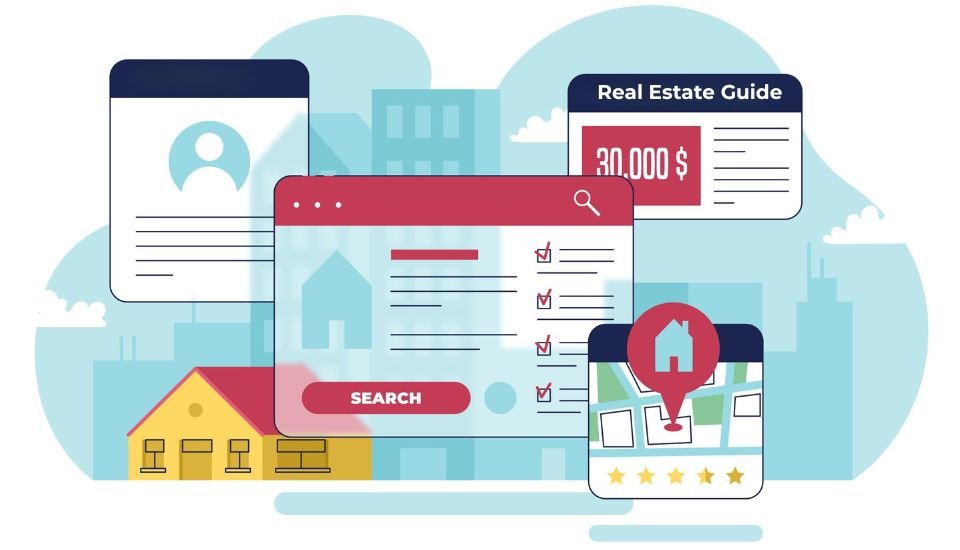
At SpeedX Marketing, we are a leading provider of innovative IT solutions tailored to meet your specific business needs. With years of expertise and a team of skilled professionals, we offer cutting-edge technology solutions that drive growth and efficiency.




In the bustling world of real estate, where every click can lead to a sale or a missed opportunity, mastering SEO isn’t just beneficial—it’s essential. Imagine your properties effortlessly surfacing in search results, enticing buyers with stunning visuals and irresistible descriptions. That’s the power of SEO for real estate agents and agencies alike. It’s the art of ensuring that your listings not only get noticed but also inspire action, whether it’s scheduling a viewing or making an offer.
In today’s digital landscape, where home seekers turn to Google before they visit an open house, SEO isn’t just about keywords and rankings; it’s about crafting a narrative that resonates. It’s about capturing the essence of each property in a way that speaks directly to your audience’s aspirations and dreams. Join us as we delve into the strategies that can elevate your real estate listings from hidden gems to must-see properties, all through the lens of strategic SEO.
Real Estate SEO refers to the practice of optimizing a real estate website to improve its visibility in search engine results pages (SERPs) for relevant queries. This includes both local and broader searches related to real estate properties, agents, and services. The goal is to attract more qualified traffic to the website, increase leads, and ultimately drive sales in the competitive real estate market.

With more people turning to search engines like Google to find properties and real estate agents, having a strong SEO strategy ensures that your business appears prominently when potential clients are searching for properties in your area or specific types of real estate services.
SEO allows you to target specific keywords that potential buyers or sellers are using in their search queries. By ranking well for these keywords, you attract visitors who are actively looking for what you offer, increasing the likelihood of conversions.
Compared to traditional advertising methods, SEO can provide a higher return on investment (ROI) because it targets users who are already interested in real estate services. It’s a long-term strategy that continues to drive traffic and leads over time, even after initial optimization efforts.
High rankings in search results convey authority and trustworthiness to potential clients. When your website consistently appears at the top of search results, users perceive your business as a reputable source for real estate services.
In a competitive market, effective SEO can differentiate your real estate business from others. It allows you to compete with larger agencies by focusing on niche markets, specific neighborhoods, or property types that larger firms may overlook.

Many real estate transactions are local, with clients looking for properties in specific neighborhoods or cities. Local SEO tactics such as optimizing Google My Business profiles, local keywords, and creating location-specific content help real estate agents and agencies capture local search traffic effectively.
Mobile devices play a significant role in real estate searches, with many users browsing properties on smartphones and tablets. Optimizing your website for mobile devices ensures a seamless user experience, improves site speed, and enhances overall visibility in mobile search results.
Content such as blog posts, neighborhood guides, market reports, and property listings not only attract potential clients but also support your SEO efforts. High-quality, relevant content that answers common real estate questions and addresses client concerns can drive organic traffic and improve engagement on your website.
A well-optimized website with intuitive navigation, clear property listings, high-quality images, and easy contact options enhances user experience. Positive UX signals, such as low bounce rates and longer session durations, can indirectly improve your SEO performance by signaling to search engines that your site satisfies user intent effectively.
Staying updated with SEO trends, such as voice search optimization, video marketing, and local schema markup, ensures that your real estate SEO strategy remains effective in an evolving digital landscape. Keeping pace with algorithm updates and user behavior shifts helps maintain and improve your search engine rankings over time.
In sum, Real Estate SEO is crucial for attracting targeted traffic, generating leads, and establishing authority in the competitive real estate market. By implementing a comprehensive SEO strategy that includes local optimization, content marketing, and user experience enhancements, real estate professionals can effectively leverage digital channels to grow their business.
As the goal of Real Estate SEO is to attract more organic (non-paid) traffic from search engines like Google by targeting keywords and phrases; potential buyers, sellers, or renters might use,here’s some significant tips:

The foundation of any successful real estate SEO strategy is an optimized website. This means that the website should not only be visually appealing but also functionally robust and aligned with the latest SEO trends. An optimized real estate website should have a user-friendly design, fast loading times, and a secure (HTTPS) connection. Ensure that your site is easy to navigate and provides a good user experience (UX). This includes having clear calls-to-action (CTAs), an intuitive menu, and a responsive design that adapts to different screen sizes. In recent years, several key trends have emerged that are reshaping how real estate websites should be optimized.
One of the most significant trends is the emphasis on mobile-first indexing. As more users search for real estate listings on their mobile devices, search engines like Google prioritize websites that offer a seamless mobile experience. An optimized real estate website should be fully responsive, ensuring that it looks and functions well on all devices, from desktops to smartphones. This includes fast loading times, easy navigation, and mobile-friendly interfaces.
Another crucial aspect is local SEO. Real estate is inherently local, and search engines have become adept at delivering hyper-local results. Incorporating local keywords naturally into your content, such as neighborhood names, local landmarks, and regional phrases, can significantly improve your website’s visibility in local searches. This also involves creating and optimizing a Google Business Profile (formerly Google My Business) to ensure your business appears in local map packs and search results.
Content quality remains a cornerstone of SEO, but the focus has shifted towards creating content that addresses the specific needs and queries of potential clients. This means producing detailed blog posts, guides, and resources that answer common questions about buying, selling, or renting properties in your area. For instance, a real estate website could feature a comprehensive guide on the home buying process, including information on securing a mortgage, understanding closing costs, and navigating the local real estate market.
User experience (UX) is another critical factor. An optimized real estate website should provide an intuitive and enjoyable experience for visitors. This includes clear calls-to-action (CTAs), easy access to property listings, and features such as virtual tours and interactive maps. These elements not only engage visitors but also signal to search engines that your website is valuable and relevant, improving its ranking potential.
Structured data markup, or schema, is a technical SEO element that has become increasingly important. Implementing structured data helps search engines understand the content of your website better, which can enhance your listings’ appearance in search results. For real estate websites, using schema to mark up property details, such as price, address, and availability, can result in rich snippets that attract more clicks.
Practical examples of these strategies in action include websites like Zillow and Realtor.com. These platforms are optimized to provide a top-notch user experience with fast load times, mobile compatibility, and extensive, locally-focused content. They use structured data to ensure their listings stand out in search results, providing detailed information and engaging visuals that draw in users. Additionally, they regularly update their blogs with relevant, helpful content that addresses the needs and interests of their audience.
By keeping up with these latest SEO trends and continually optimizing your website, you can significantly enhance your visibility and effectiveness in the competitive real estate market. This not only attracts more visitors to your site but also increases the likelihood of converting these visitors into clients, ultimately driving the success of your real estate business.

One of the key elements of an effective real estate SEO strategy is targeting the right (local) keywords. This involves understanding and utilizing the specific terms and phrases that potential clients in a particular area are using to search for real estate services. For instance, instead of using a generic keyword like “homes for sale,” a more effective approach would be to target a localized keyword such as “homes for sale in Portland.” This localized targeting is becoming increasingly important as search engines continue to refine their algorithms to provide more relevant results based on user intent and location.
The trend towards hyper-local SEO is particularly significant in the real estate sector. Search engines now prioritize providing users with the most relevant local results, meaning that real estate businesses must focus on optimizing for specific neighborhoods or even particular streets. This can be achieved by creating content that speaks directly to the local market. For example, a real estate agent in Portland could write blog posts about the unique aspects of different neighborhoods, such as the best schools, local amenities, and community events. These posts not only help with keyword targeting but also establish the agent as a local expert, which can build trust with potential clients.
In practical terms, implementing a local keyword strategy involves several steps. First, conducting thorough keyword research using tools like Google Keyword Planner or Ahrefs to identify the most relevant and high-traffic keywords for the area. Once these keywords are identified, they should be incorporated naturally into various parts of the website, including titles, meta descriptions, headers, and content. Additionally, it’s beneficial to create specific landing pages for different neighborhoods or property types, each optimized with the relevant local keywords.
Another critical aspect is ensuring that the business’s information is consistent and accurate across all online platforms, particularly on Google Business Profile (formerly Google My Business). This includes the correct address, phone number, and business hours. Positive reviews and regular updates can also enhance local SEO performance.
One real-life example of successful local keyword targeting can be seen with real estate companies that dominate their local search results. For instance, a real estate firm in Miami that specializes in waterfront properties might focus on keywords like “Miami waterfront homes” or “luxury beachfront condos in Miami.” By consistently producing content around these terms, optimizing their website accordingly, and ensuring their Google Business Profile is updated and populated with positive reviews, they can achieve higher rankings and attract more qualified leads.
The dynamics of SEO are continually evolving, with an increasing emphasis on user experience, mobile optimization, and voice search. Mobile optimization is particularly crucial for real estate SEO, given the growing number of users searching for properties on their smartphones. A mobile-friendly website with fast load times and easy navigation can significantly enhance user experience and improve search rankings.
Voice search is another emerging trend affecting real estate SEO. As more people use devices like Google Home and Amazon Alexa to search for information, optimizing for voice search becomes essential. This means focusing on more conversational and question-based keywords, such as “What are the best neighborhoods to buy a house in Portland?” or “Top real estate agents near me.”
By staying updated with the latest SEO trends, such as mobile optimization and voice search, and applying practical, localized content strategies, real estate businesses can significantly improve their online visibility and attract more potential clients.
3.Create High-Value Content

High-value content is informative, engaging, and provides real value to your audience. This could include blog posts, guides, market reports, videos, and infographics that help potential buyers or sellers make informed decisions.
Creating high-value content is one of the most effective ways to drive organic traffic and establish your real estate website as an authority in the industry. This involves producing content that is not only relevant and informative but also engaging and shareable. For example, consider developing comprehensive neighborhood guides that provide valuable insights into local amenities, schools, and market trends. These guides can attract home buyers interested in specific areas and position your site as a go-to resource for local real estate information.
Another approach is to produce detailed property listings with rich media, such as high-quality images, virtual tours, and video walkthroughs. This not only enhances user experience but also helps your site stand out in search results. Additionally, creating blog posts on trending real estate topics, such as market forecasts or home improvement tips, can drive traffic and encourage social sharing.
The dynamics of SEO are continually evolving, with search engines placing more emphasis on user experience and content quality. As AI and machine learning technologies become more sophisticated, search engines are better at understanding context and user intent. This means that real estate SEO strategies must focus on delivering relevant, high-quality content that meets users’ needs and expectations.
By focusing on creating valuable content that meets the needs of potential clients and leveraging the latest SEO trends, real estate professionals can enhance their online presence and achieve better results in their marketing efforts.

With more people using mobile devices to search for real estate, it’s crucial that your website is mobile-friendly. Google also uses mobile-first indexing, meaning it primarily uses the mobile version of a site for ranking and indexing.
With the increasing use of smartphones for browsing and searching for real estate, optimizing for mobile users is essential. Mobile optimization involves ensuring that your website is responsive, meaning it adjusts seamlessly to different screen sizes. A mobile-friendly website improves user experience and reduces bounce rates, which can positively impact your search engine rankings.
Recent trends highlight the importance of mobile page speed. Google prioritizes fast-loading pages in its rankings, and mobile users expect quick access to information. For instance, a real estate website with slow loading times may frustrate users, leading them to leave the site and potentially miss out on a property that interests them. Implementing techniques like optimizing images, leveraging browser caching, and minimizing JavaScript can enhance mobile page speed.
Additionally, user experience on mobile devices includes easy navigation and clear calls-to-action. For example, a real estate website should have a prominent, easy-to-click phone number for quick inquiries and an intuitive property search filter that works well on mobile screens. Integrating features like click-to-call buttons and streamlined forms can further improve user engagement and conversion rates.
Consider how real estate websites like Zillow or Realtor.com are designed with mobile users in mind. They feature large, clickable buttons, fast-loading images, and straightforward navigation that allows users to search for properties, view details, and contact agents with ease from their mobile devices. Implementing similar practices on your site—such as using responsive design frameworks, optimizing images for faster loading, and simplifying navigation—can significantly enhance user experience and improve your site’s performance in search engine rankings.

Social media plays a vital role in enhancing SEO efforts, particularly in generating backlinks. By sharing valuable content and engaging with the audience on platforms like Facebook, Instagram, and LinkedIn, real estate businesses can encourage users to link back to their website. Social media platforms can drive traffic to your site and help you build backlinks, which are important for SEO. Sharing your content on social media increases its reach and the chances of it being linked to by other websites. For example, posting property listings with eye-catching visuals and compelling descriptions can prompt followers to share the posts, creating natural backlinks to your site. Additionally, engaging in social media groups related to real estate can provide opportunities for acquiring backlinks through shared content and expert discussions.
Backlinks are still a crucial factor for ranking higher in search results. However, it’s not just about the quantity of backlinks but their quality. Links from authoritative sources and relevant sites are more valuable. Social media helps bridge this gap by facilitating connections with influencers, industry experts, and local businesses, which can lead to high-quality backlinks. For instance, collaborating with a popular local blogger for a feature on your properties or guest posting on a real estate industry site can generate significant referral traffic and enhance your SEO efforts.
Leveraging social media for real estate SEO can be seen in the use of Instagram by real estate agents. By posting visually appealing content such as property showcases, client testimonials, and behind-the-scenes glimpses of the buying process, agents can attract a local following. Additionally, using relevant hashtags and location tags helps potential clients find these posts. This strategy not only drives direct traffic to the website but also builds a network of backlinks as other local influencers and real estate professionals engage with the content.
The integration of these practices involving social media engagement—demonstrates how real estate SEO is adapting to current trends. As search engines continue to refine their algorithms to prioritize user intent and local relevance, real estate professionals must stay updated with these changes and adjust their strategies accordingly. By doing so, they can maintain a competitive edge and effectively reach their target audience in an increasingly crowded market.

Tracking Key Performance Indicators (KPIs) is vital for measuring the success of your real estate SEO strategy. Important KPIs include organic traffic, keyword rankings, and conversion rates. Organic traffic indicates how many visitors are coming to your site through search engines, while keyword rankings show how well your site is performing for targeted search terms. Conversion rates measure how effectively your site turns visitors into leads or clients.
For instance, if you notice a high volume of traffic but a low conversion rate, this might indicate issues with your site’s user experience or the effectiveness of your calls-to-action. Tools like Google Analytics and Google Search Console provide valuable insights into these metrics. Regularly reviewing and analyzing these KPIs allows you to adjust your SEO strategy, such as optimizing underperforming pages or targeting new keywords based on emerging trends.
By regularly tracking key performance metrics, real estate professionals can enhance their online presence and attract more potential clients in a competitive market.
Having dedicated pages for different aspects of your business, such as property listings, neighborhood guides, and contact information, helps search engines understand your site’s structure. Additionally, listing your business in relevant online directories improves your local SEO.
Setting up relevant pages on your website is fundamental to real estate SEO. This includes creating dedicated pages for different property types, neighborhoods, and services. Each page should be optimized with specific keywords and provide valuable information that addresses the needs and queries of potential buyers or renters. For instance, a real estate website might have separate pages for “Luxury Homes in Beverly Hills,” “Rental Properties in Miami,” and “Commercial Real Estate in New York City.” Each of these pages should feature detailed descriptions, high-quality images, and local information to help users make informed decisions and improve the page’s relevance and ranking.
Additionally, listing your properties and business in online directories like Zillow, Realtor.com, and local business directories can significantly boost your SEO efforts. Ensure that your listings are complete, with accurate information, high-quality photos, and compelling descriptions. Consistency in your business name, address, and phone number (NAP) across these directories helps build credibility with search engines and improves your local search rankings. For example, if your real estate business is listed on multiple directories but has inconsistent address information, it can confuse search engines and negatively impact your local SEO performance.

There’s some SEO tactics Real Estate Agents must avoid in order to establish authority in the competitive real estate market.
Publishing identical or very similar content across multiple pages or websites can result in reduced search engine rankings.
With more users accessing the internet via mobile devices, neglecting mobile optimization can lead to higher bounce rates and lower rankings.
Overloading website content with excessive keywords in an unnatural way can harm readability and SEO performance.
Purchasing links from link farms or irrelevant websites can result in penalties from search engines. Focus on natural link building through quality content and relationships.
Sending visitors to a different URL than they expected, often without their knowledge or consent, violates search engine guidelines and can result in penalization.
To stay current with the latest trends in real estate SEO, consider the following:
By implementing these strategies and staying updated with the latest SEO trends, real estate professionals can enhance their online presence, attract more qualified leads, and ultimately increase sales and client satisfaction.
Imagine you manage a real estate agency in San Francisco specializing in commercial properties. By focusing on local SEO tactics such as optimizing your Google My Business profile with accurate business information, gathering positive reviews from satisfied clients, and creating content around keywords like “office spaces San Francisco financial district,” your agency can attract local businesses looking to lease or buy office spaces in that specific area.
You regularly update your website with new listings, virtual tours, and neighborhood guides, ensuring each property page is optimized with relevant keywords and detailed descriptions. This approach not only helps your website rank higher in local search results but also enhances user experience, leading to higher engagement and conversion rates.
By consistently applying these SEO strategies, your real estate agency establishes a strong online presence, attracts targeted traffic, and ultimately increases sales and leases, demonstrating the practical effectiveness of a well-executed real estate SEO strategy.

